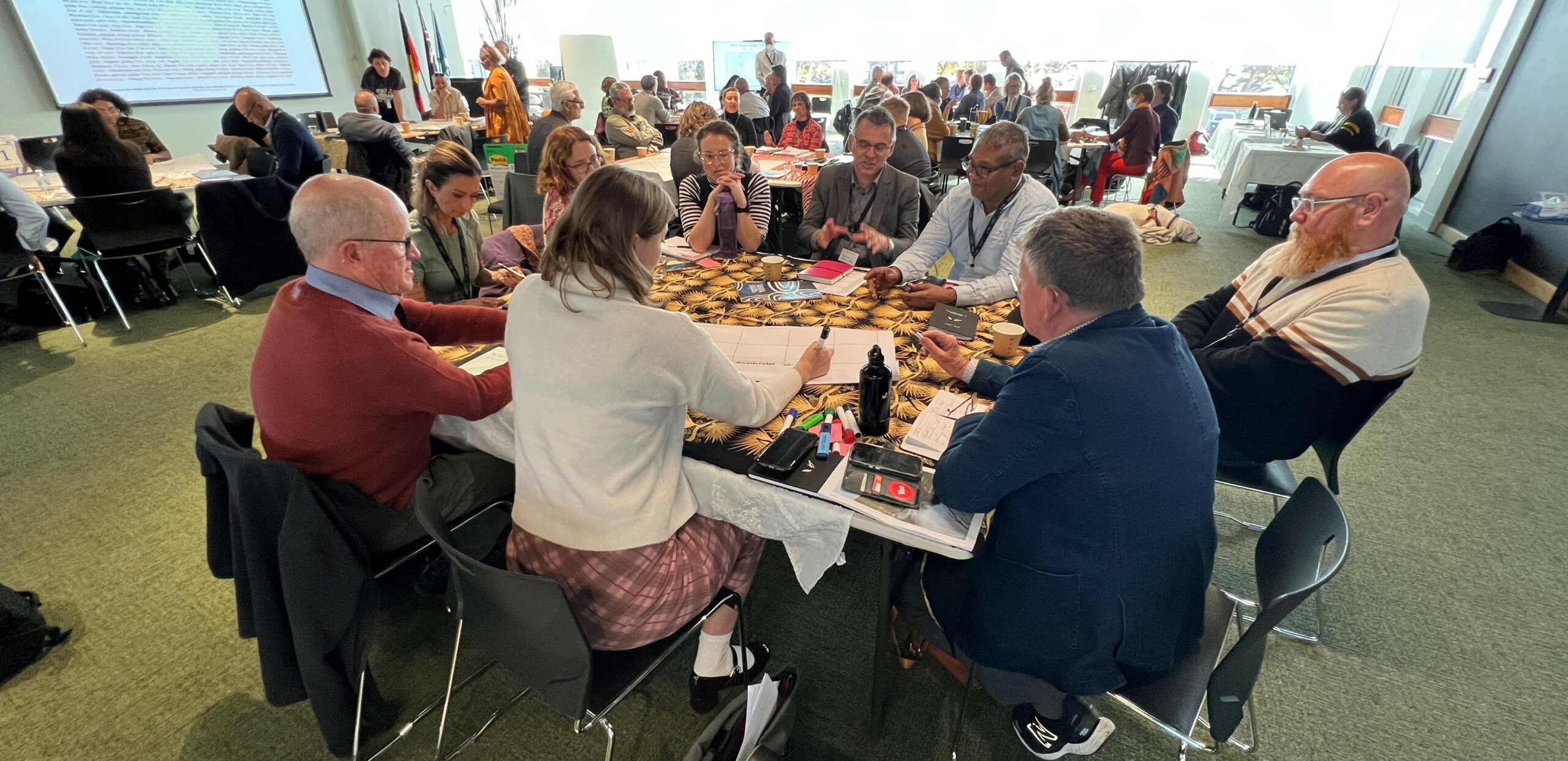The National First Nations’ Water Roundtable was held on the Country and Waterways of the Ngambri (Kamberri), Ngunnawal and Ngarigo peoples, at the Australian National University (ANU) in Canberra on 16-17 May, 2023.
A joint initiative of the ANU*, the Indigenous Land and Sea Corporation (ILSC) and the National Native Title Council (NNTC), the historic Roundtable was attended by a diverse group of over 80 people with expertise on First Nations water rights and its intersection with public policy and water management.
They comprised First Nations representatives from across Australia at the centre of managing their lands and waters; researchers with extensive experience collaborating with First Nations people and government policy makers who work in this space.
The Roundtable program facilitated three workshops that enabled dialogue concerning current policy settings; gaps and issues as they relate to securing First Nations self-determination; and practical solutions and strategies to enable appropriate institutional and policy frameworks.
The meeting heard from First Nations leaders around the country about the unique view of First Nations people who do not separate water from land, sea and their communities and how this connectivity has allowed First Nations to live sustainably for more than 65,000 years. It also heard of the dire and urgent circumstances surrounding First Nations access to water as it relates to First Nations holding rights to about 40% of Australian land through native title and traditional ownership – yet own and control less than 0.2 percent of surface water entitlements.
The meeting agreed that a lack of recognition and access contributes to widening the gap of First Nations disadvantage, leading to poor environmental outcomes as highlighted in the State of the Environment Report 2021, and contributing to inefficient use and management of Australia’s natural resources at an unsustainable level for future generations.
Revisiting previous work undertaken across the country, the meeting noted the key challenges of lack of ownership over water access entitlements; lack of participation in water governance regimes; fragmented legislative regimes across States and Territory jurisdictions; rural and remote communities lacking access to clean drinking water; and the lack of institutional frameworks and practices consistent with the United Nations Declaration on the Rights of Indigenous Peoples (UNDRIP).
The meeting noted opportunities to advance First Nations peoples’ rights to water in Australia through the implementation of UNDRIP and the United Nations’ Sustainability Development Goals and in the Australian policy environment, through the proposed reforms to the Environment Protection and Biodiversity Conservation Act 1999; refresh of the National Water Initiative; the 2026 review of the Murray Darling Basin Plan; and the 2024 review of the Water Act 2007.
There was consensus at the Roundtable for a new approach to advance First Nations water rights and needs in the context of an increasingly positive national political environment highlighted by the Albanese Government’s commitment to re-establish the National Water Commission, and its announcement in May 2023 to increase First Nations water ownership.
“Aboriginal and Torres Strait Islander people have told me that the current arrangements for water holding isn’t always appropriate for First Nations, who have their own cultural and economic needs and aspirations”, said the Hon Tanya Plibersek MP, Minister for Environment and Water, in a joint statement with the Hon Linda Burney MP, Minister for Indigenous Australians.
As evidenced from work in the Murray Darling Basin and northern Australia, that approach should be built around a First Nations led, nationally consistent approach to First Nations’ water rights, that is informed by evidence and international trends towards water justice for First Nations people and equitable participation in the nation’s social, economic and environmental futures.
It was recommended that going forward a First Nations Working Group be convened to facilitate the development of a First Nations led, nationally consistent approach to First Nations’ water rights. The Working Group would be a loose federation of experts with experience in advocating the rights and interests of First Nations over the past decades. The role of the Working Group should extend to facilitating the establishment of a First Nations alliance that can negotiate and seek to reach a national accord with all Australian Governments to implement this new approach.
The Roundtable co-convenors will act collectively to progress this recommendation as a matter of urgency with respect to engaging with appropriate agencies in its construct and design.
* The ANU was represented by a consortium of the First Nations Portfolio, Water Justice Hub, Institute for Water Futures and Centre for Aboriginal Economic Policy Research.
RESOURCE LINKS
